安徽省六安市商业干校2012-2013学年高二12月月考英语试题
文档属性
| 名称 | 安徽省六安市商业干校2012-2013学年高二12月月考英语试题 |
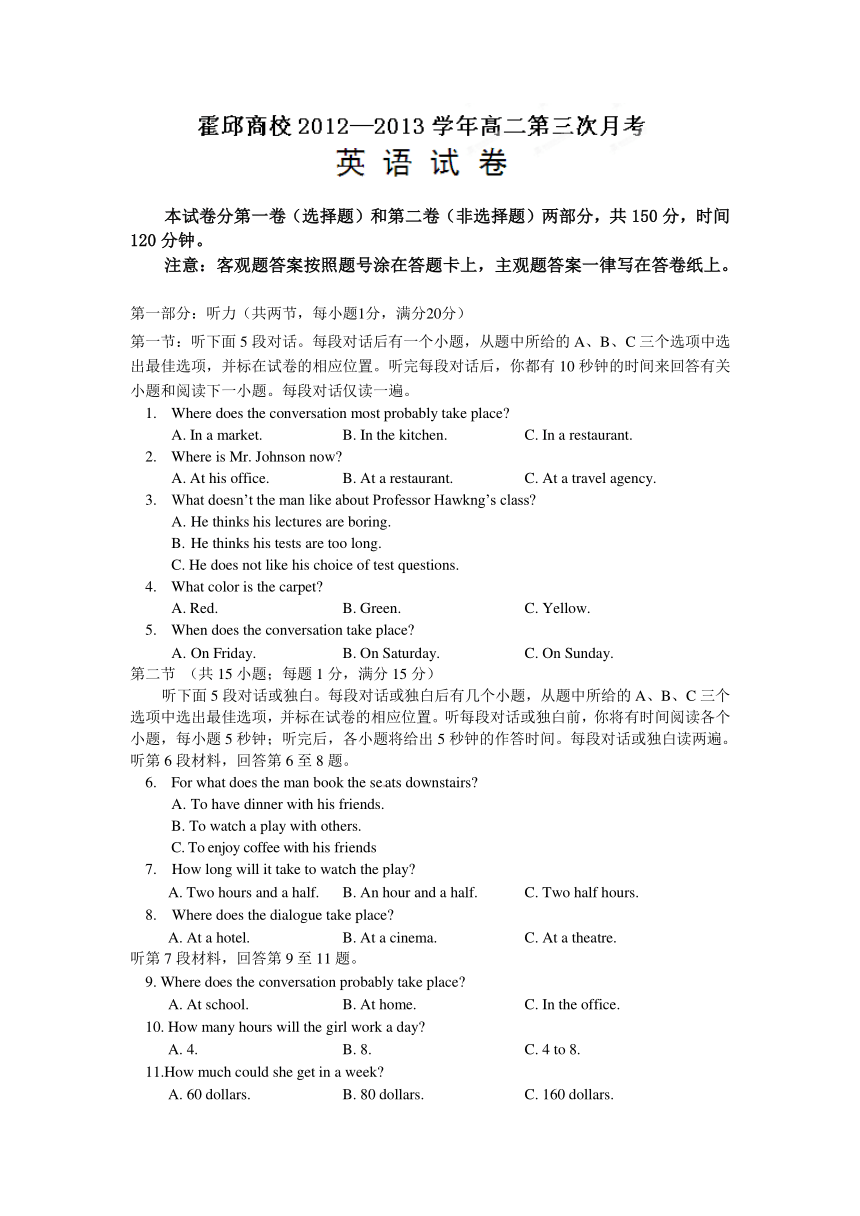
|
|
| 格式 | zip | ||
| 文件大小 | 92.0KB | ||
| 资源类型 | 教案 | ||
| 版本资源 | |||
| 科目 | 英语 | ||
| 更新时间 | 2013-01-03 18:18:54 | ||
图片预览

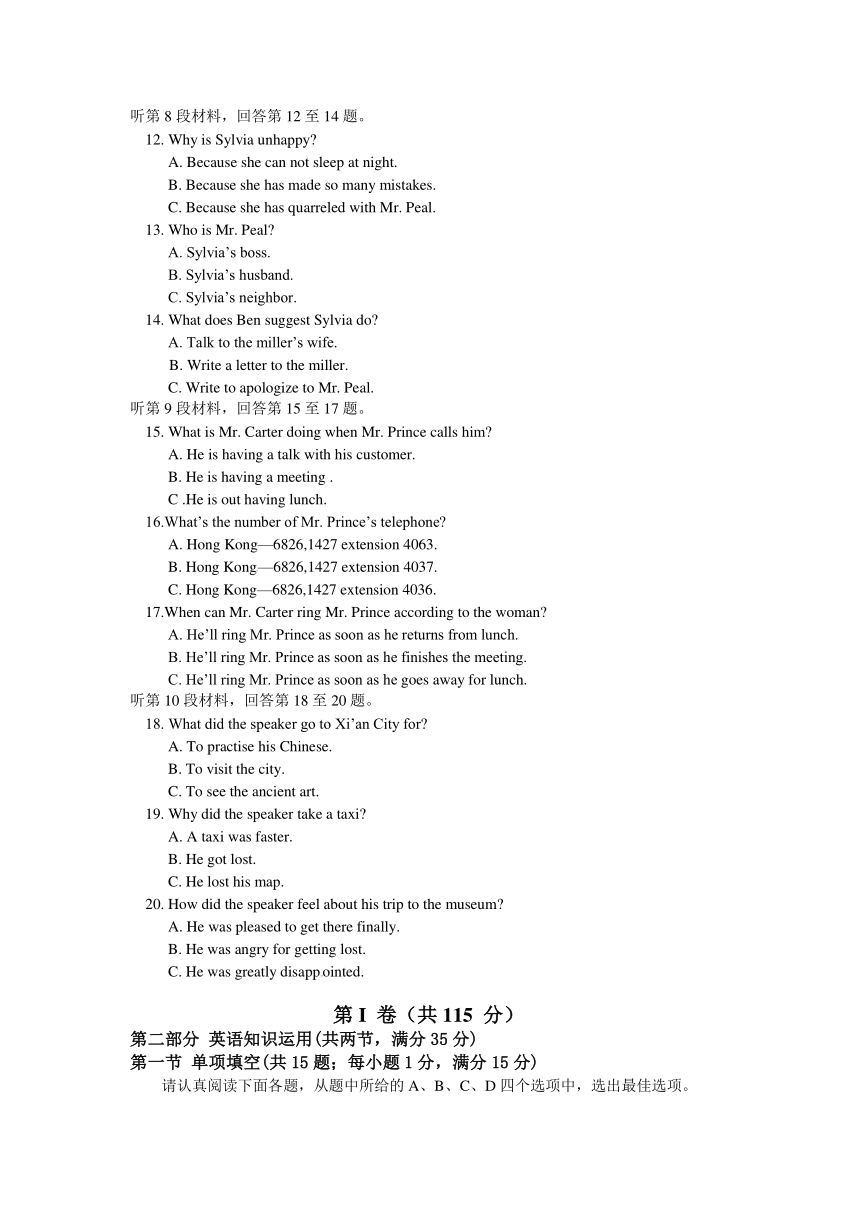
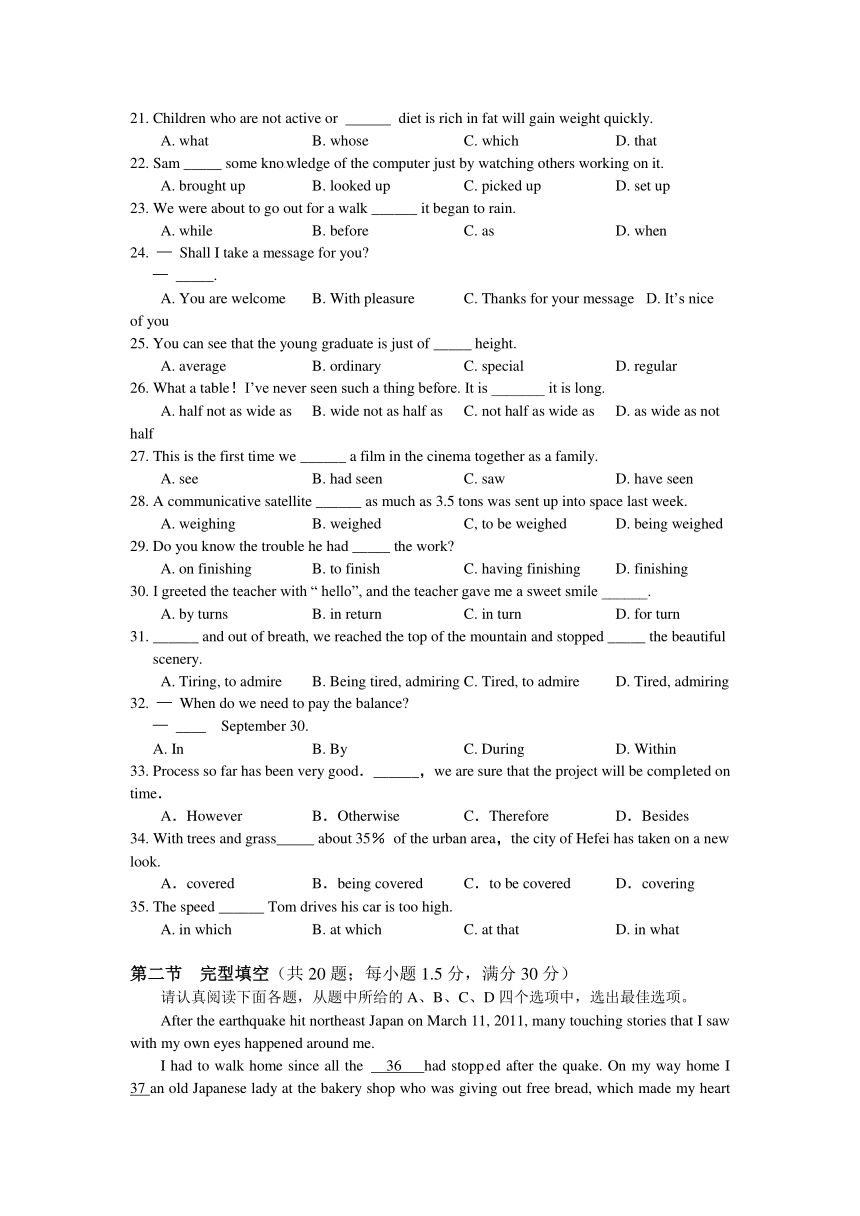
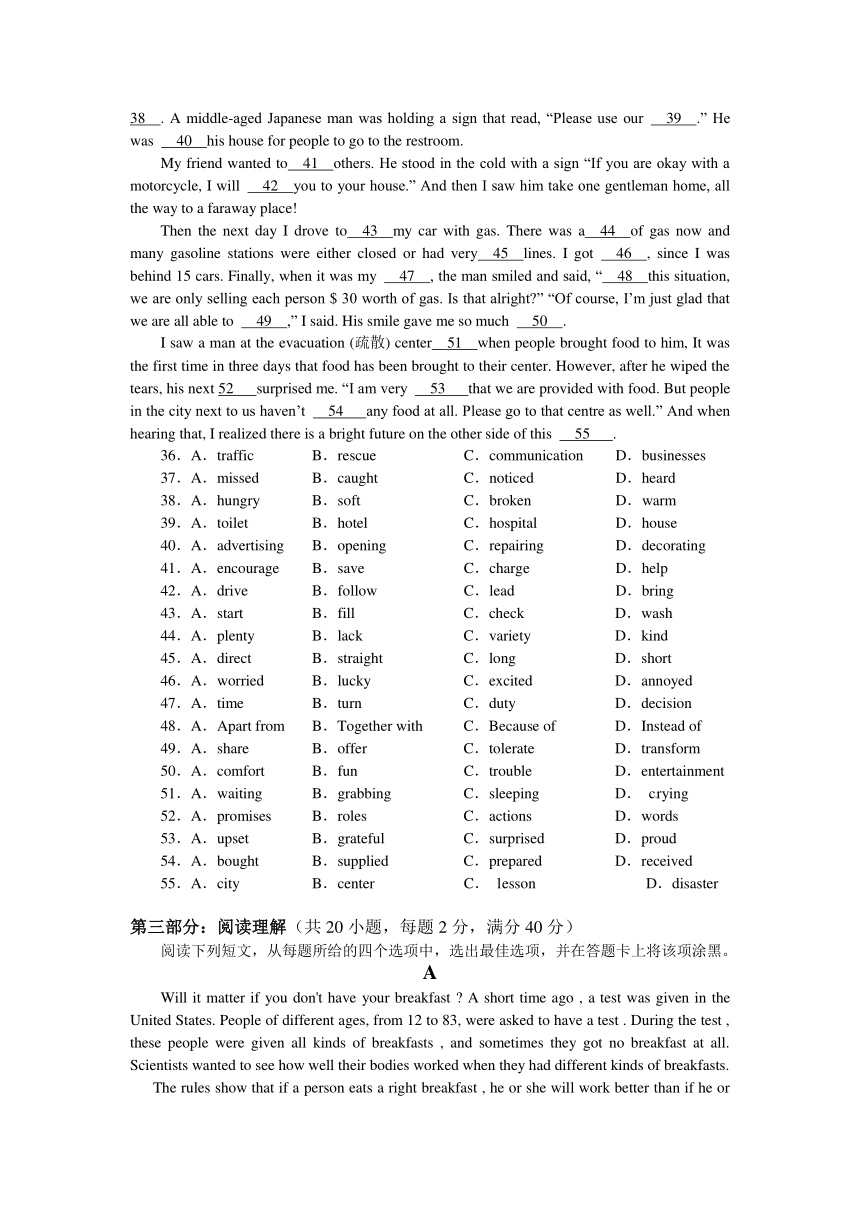
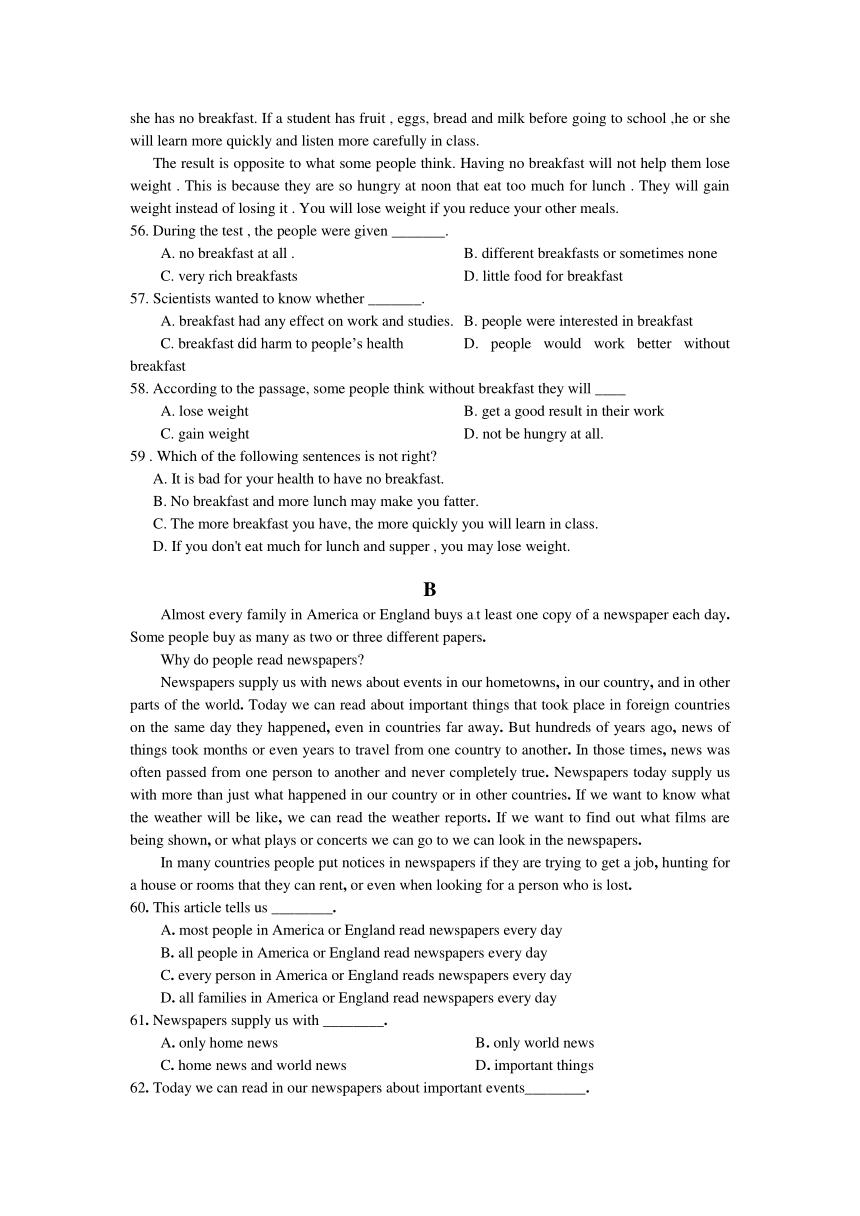
文档简介
本试卷分第一卷(选择题)和第二卷(非选择题)两部分,共150分,时间120分钟。
注意:客观题答案按照题号涂在答题卡上,主观题答案一律写在答卷纸上。
第一部分:听力(共两节,每小题1分,满分20分)
第一节:听下面5段对话。每段对话后有一个小题,从题中所给的A、B、C三个选项中选出最佳选项,并标在试卷的相应位置。听完每段对话后,你都有10秒钟的时间来回答有关小题和阅读下一小题。每段对话仅读一遍。
Where does the conversation most probably take place?
A. In a market. B. In the kitchen. C. In a restaurant.
Where is Mr. Johnson now?
A. At his office. B. At a restaurant. C. At a travel agency.
What doesn’t the man like about Professor Hawkng’s class?
A. He thinks his lectures are boring.
B. He thinks his tests are too long.
C. He does not like his choice of test questions.
What color is the carpet?
A. Red. B. Green. C. Yellow.
When does the conversation take place?
A. On Friday. B. On Saturday. C. On Sunday.
第二节 (共15小题;每题1分,满分15分)
听下面5段对话或独白。每段对话或独白后有几个小题,从题中所给的A、B、C三个选项中选出最佳选项,并标在试卷的相应位置。听每段对话或独白前,你将有时间阅读各个小题,每小题5秒钟;听完后,各小题将给出5秒钟的作答时间。每段对话或独白读两遍。
听第6段材料,回答第6至8题。
For what does the man book the seats downstairs?
A. To have dinner with his friends.
B. To watch a play with others.
C. To enjoy coffee with his friends
7. How long will it take to watch the play?
A. Two hours and a half. B. An hour and a half. C. Two half hours.
8. Where does the dialogue take place?
A. At a hotel. B. At a cinema. C. At a theatre.
听第7段材料,回答第9至11题。
9. Where does the conversation probably take place?
A. At school. B. At home. C. In the office.
10. How many hours will the girl work a day?
A. 4. B. 8. C. 4 to 8.
11.How much could she get in a week?
A. 60 dollars. B. 80 dollars. C. 160 dollars.
听第8段材料,回答第12至14题。
12. Why is Sylvia unhappy?
A. Because she can not sleep at night.
B. Because she has made so many mistakes.
C. Because she has quarreled with Mr. Peal.
13. Who is Mr. Peal?
A. Sylvia’s boss.
B. Sylvia’s husband.
C. Sylvia’s neighbor.
14. What does Ben suggest Sylvia do?
A. Talk to the miller’s wife.
B. Write a letter to the miller.
C. Write to apologize to Mr. Peal.
听第9段材料,回答第15至17题。
15. What is Mr. Carter doing when Mr. Prince calls him?
A. He is having a talk with his customer.
B. He is having a meeting .
C .He is out having lunch.
16.What’s the number of Mr. Prince’s telephone?
A. Hong Kong—6826,1427 extension 4063.
B. Hong Kong—6826,1427 extension 4037.
C. Hong Kong—6826,1427 extension 4036.
17.When can Mr. Carter ring Mr. Prince according to the woman?
A. He’ll ring Mr. Prince as soon as he returns from lunch.
B. He’ll ring Mr. Prince as soon as he finishes the meeting.
C. He’ll ring Mr. Prince as soon as he goes away for lunch.
听第10段材料,回答第18至20题。
18. What did the speaker go to Xi’an City for?
A. To practise his Chinese.
B. To visit the city.
C. To see the ancient art.
19. Why did the speaker take a taxi?
A. A taxi was faster.
B. He got lost.
C. He lost his map.
20. How did the speaker feel about his trip to the museum?
A. He was pleased to get there finally.
B. He was angry for getting lost.
C. He was greatly disappointed.
第I 卷(共115 分)
第二部分 英语知识运用(共两节,满分35分)
第一节 单项填空(共15题;每小题1分,满分15分)
请认真阅读下面各题,从题中所给的A、B、C、D四个选项中,选出最佳选项。
21. Children who are not active or diet is rich in fat will gain weight quickly.
A. what B. whose C. which D. that
22. Sam _____ some knowledge of the computer just by watching others working on it.
A. brought up B. looked up C. picked up D. set up
23. We were about to go out for a walk ______ it began to rain.
A. while B. before C. as D. when
24. — Shall I take a message for you?
— _____.
A. You are welcome B. With pleasure C. Thanks for your message D. It’s nice of you
25. You can see that the young graduate is just of _____ height.
A. average B. ordinary C. special D. regular
26. What a table!I’ve never seen such a thing before. It is _______ it is long.
A. half not as wide as B. wide not as half as C. not half as wide as D. as wide as not half
27. This is the first time we ______ a film in the cinema together as a family.
A. see??? B. had seen???? C. saw??? D. have seen
28. A communicative satellite ______ as much as 3.5 tons was sent up into space last week.
A. weighing B. weighed C, to be weighed D. being weighed
29. Do you know the trouble he had _____ the work?
A. on finishing B. to finish C. having finishing D. finishing
30. I greeted the teacher with “ hello”, and the teacher gave me a sweet smile ______.
A. by turns B. in return C. in turn D. for turn
31. ______ and out of breath, we reached the top of the mountain and stopped _____ the beautiful scenery.
A. Tiring, to admire B. Being tired, admiring C. Tired, to admire D. Tired, admiring
32. — When do we need to pay the balance?
— ____ September 30.
A. In B. By C. During D. Within
33. Process so far has been very good.______,we are sure that the project will be completed on time.
A.However B.Otherwise C.Therefore D.Besides
34. With trees and grass_____ about 35% of the urban area,the city of Hefei has taken on a new look.
A.covered B.being covered C.to be covered D.covering
35. The speed ______ Tom drives his car is too high.
A. in which B. at which C. at that D. in what
第二节 完型填空(共20题;每小题1.5分,满分30分)
请认真阅读下面各题,从题中所给的A、B、C、D四个选项中,选出最佳选项。
After the earthquake hit northeast Japan on March 11, 2011, many touching stories that I saw with my own eyes happened around me.
I had to walk home since all the 36 had stopped after the quake. On my way home I 37 an old Japanese lady at the bakery shop who was giving out free bread, which made my heart 38 . A middle-aged Japanese man was holding a sign that read, “Please use our 39 .” He was 40 his house for people to go to the restroom.
My friend wanted to 41 others. He stood in the cold with a sign “If you are okay with a motorcycle, I will 42 you to your house.” And then I saw him take one gentleman home, all the way to a faraway place!
Then the next day I drove to 43 my car with gas. There was a 44 of gas now and many gasoline stations were either closed or had very 45 lines. I got 46 , since I was behind 15 cars. Finally, when it was my 47 , the man smiled and said, “ 48 this situation, we are only selling each person $ 30 worth of gas. Is that alright?” “Of course, I’m just glad that we are all able to 49 ,” I said. His smile gave me so much 50 .
I saw a man at the evacuation (疏散) center 51 when people brought food to him, It was the first time in three days that food has been brought to their center. However, after he wiped the tears, his next 52 surprised me. “I am very 53 that we are provided with food. But people in the city next to us haven’t 54 any food at all. Please go to that centre as well.” And when hearing that, I realized there is a bright future on the other side of this 55 .
36.A.traffic B.rescue C.communication D.businesses
37.A.missed B.caught C.noticed D.heard
38.A.hungry B.soft C.broken D.warm
39.A.toilet B.hotel C.hospital D.house
40.A.advertising B.opening C.repairing D.decorating
41.A.encourage B.save C.charge D.help
42.A.drive B.follow C.lead D.bring
43.A.start B.fill C.check D.wash
44.A.plenty B.lack C.variety D.kind
45.A.direct B.straight C.long D.short
46.A.worried B.lucky C.excited D.annoyed
47.A.time B.turn C.duty D.decision
48.A.Apart from B.Together with C.Because of D.Instead of
49.A.share B.offer C.tolerate D.transform
50.A.comfort B.fun C.trouble D.entertainment
51.A.waiting B.grabbing C.sleeping D. crying
52.A.promises B.roles C.actions D.words
53.A.upset B.grateful C.surprised D.proud
54.A.bought B.supplied C.prepared D.received
55.A.city B.center C. lesson D.disaster
第三部分:阅读理解(共20小题,每题2分,满分40分)
阅读下列短文,从每题所给的四个选项中,选出最佳选项,并在答题卡上将该项涂黑。
A
Will it matter if you don't have your breakfast ? A short time ago , a test was given in the United States. People of different ages, from 12 to 83, were asked to have a test . During the test , these people were given all kinds of breakfasts , and sometimes they got no breakfast at all. Scientists wanted to see how well their bodies worked when they had different kinds of breakfasts.
The rules show that if a person eats a right breakfast , he or she will work better than if he or she has no breakfast. If a student has fruit , eggs, bread and milk before going to school ,he or she will learn more quickly and listen more carefully in class.
The result is opposite to what some people think. Having no breakfast will not help them lose weight . This is because they are so hungry at noon that eat too much for lunch . They will gain weight instead of losing it . You will lose weight if you reduce your other meals.
56. During the test , the people were given _______.
A. no breakfast at all . B. different breakfasts or sometimes none
C. very rich breakfasts D. little food for breakfast
57. Scientists wanted to know whether _______.
A. breakfast had any effect on work and studies. B. people were interested in breakfast
C. breakfast did harm to people’s health D. people would work better without breakfast
58. According to the passage, some people think without breakfast they will ____
A. lose weight B. get a good result in their work
C. gain weight D. not be hungry at all.
59 . Which of the following sentences is not right?
A. It is bad for your health to have no breakfast.
B. No breakfast and more lunch may make you fatter.
C. The more breakfast you have, the more quickly you will learn in class.
D. If you don't eat much for lunch and supper , you may lose weight.
B
Almost every family in America or England buys at least one copy of a newspaper each day. Some people buy as many as two or three different papers.
Why do people read newspapers?
Newspapers supply us with news about events in our hometowns, in our country, and in other parts of the world. Today we can read about important things that took place in foreign countries on the same day they happened, even in countries far away. But hundreds of years ago, news of things took months or even years to travel from one country to another. In those times, news was often passed from one person to another and never completely true. Newspapers today supply us with more than just what happened in our country or in other countries. If we want to know what the weather will be like, we can read the weather reports. If we want to find out what films are being shown, or what plays or concerts we can go to we can look in the newspapers.
In many countries people put notices in newspapers if they are trying to get a job, hunting for a house or rooms that they can rent, or even when looking for a person who is lost.
60. This article tells us ________.
A. most people in America or England read newspapers every day
B. all people in America or England read newspapers every day
C. every person in America or England reads newspapers every day
D. all families in America or England read newspapers every day
61. Newspapers supply us with ________.
A. only home news B. only world news
C. home news and world news D. important things
62. Today we can read in our newspapers about important events________.
A. that took place hundreds of years ago
B. that took place in faraway countries soon after they happened
C. that will take place in foreign countries
D. that will take place in the world
63. Which is NOT TRUE according to the passage?
A. The habit of reading newspapers is found among most people.
B. Newspapers not only supply us with news from all over the world but also give us a lot of useful information.
C. Hundreds of years ago news was not wholly true because it was told in spoken words.
D. If you have no place to live in, you can put notice in a newspaper and then you will certainly get a room to live in.
C
In the US, people prefer waiting for a table to sitting with people they don’t know. If you are sitting at a table with people you don’t know, it is impolite to light up a cigarette without first asking if it will disturb them.
At American restaurants and coffee shops you are usually served tap water before you order. You may find the bread and butter is free, and if you order coffee, you may get a free refill.
Most cities and towns have no rules about opening and closing times for stores or restaurants, though they usually do make rules for bars. Especially in large cities, stores may be open 24 hours a day.
Servings in restaurants are often large, too large for many people. If you can’t finish your meal but would like to enjoy the food later, ask your waitress or waiter for a “doggie bag”. It may have a picture of a dog on it, but everybody knows you’re taking the food for yourself. Supper and dinner are both words for the evening meal. Some people have “Sunday dinner”. This is an especially big noon meal.
Tips are not usually added to the check. They are not included in the price of the meal, either. A tip of about 15% is expected and you should leave it on the table when you leave. In some restaurants, a check is brought on a plate and you put your money there. Then the waiter or waitress brings you your change.
64. Which statement is TRUE?
A. American people like sitting with people they don’t know.
B. Americans prefer smoking to tap water at the restaurants..
C. Bread and butter and coffee are free at American restaurants.
D. American people usually will not smoke unless they ask for permission.
65. What are the opening and closing times for stores and restaurants in the US?
A. There are no rules for stores and restaurants.
B. You can enter a bar at any time in the US.
C. Stores may be open around the clock in large cities.
D. Restaurants may be open 24 hours a day in every city.
66. What do American people always do when servings are too large for them?
A. They leave the food on the table and go away.
B. They ask the waitress or waiter to keep the food.
C. They take the food home with a “doggie bag” for their dogs.
D. They take the food home with a “doggie bag” and enjoy the food later.
67. What can you learn about “tips” according to the passage?
A. Customers often add tips to their check.
B. Tips are left on the table when customers leave.
C. People are not expected to pay tips in addition.
D. The price of the meal usually includes the tip.
D
Do you know how to be happy? Here are six ways for you to find more pleasure in your life.
Play that song you love so much. As a preschooler can tell you, repetition can lead to pleasure. When you experience something more than once, you notice more details about it each time, and it increases your enjoyment. That’s why you love revisiting that jazz club, favourite restaurant, and beloved old Woody Allen movie. Of course, you can overdo it.
Don’t buy boxed sets of DVDs. Economist(经济学家) Tyler says that much of the joy we get from our buying lies in the experience of finding them out, getting them home, and opening them up. If you receive 18 DVDs in one package, you’ll use up the excitement all at once. Buy things one a time and space out the pleasure.
Look outside. People long ago spent almost all of their time outside with trees, water, and sky around. The world in which most of us spend our time nowadays is unnatural and can harm the spirit. Even being close to nature for a short time can make us happy.
________. Physical contact with animals works wonders. You can pet an animal. It increases the brain chemicals connected with pleasure and decreases those connected with stress(压力). Even people without pets can get some of the effect by hanging out for a few minutes at a dog shelter.
Smile. Well, like it or not, smiling improves your mood. Here’s why: people react better to you when you look happy, which in turn leads you to be happy. What’s more, looking happy fools your brain into thinking that you are happy.
68. According to the writer, buying things one at a time can ________.
A. helps us save some money. B. spare time for other activities
C. increase our experience of happiness D. give us more time to consider buying things.
69. What’s the best title for Paragraph 5 ?
A. Exercise the brain B. Pet an animal
C. Reduce work stress D. Hang out more often
70. Which of the following is right?
A. Repetition results in pleasure. B. Smiles fool others’ mood.
C. Animals add to your stress. D. Spending time outside harms your spirit.
71. What is most likely to be discussed in the paragraph that follows?
A. The effect of pleasure on life. B. The writer’s own experience.
C. Another way to find pleasure. D. Reasons for finding more pleasure.
E
If the child has been brought up in a loving, openly communicative environment, the relationship with parents would be a strong one.It is only when there are ongoing troubles in the relationship between parents and the child that there is a breakdown in communication.
When parents are going through difficulties in their own relationship the child sometimes develops guilt.The child can hold himself or herself responsible for the breakdown in relationship between the parents.This needs to be explained to the child, who won’t speak out this guilt.
The teenage years are emotionally sensitive years to the outside world.For the first time the child realizes his or her position in society.Friends suddenly become more important than parents.It is during this time that the relationship between children and parents is tested.If the bond with parents is strong, the child will not be swayed by the drug and alcohol culture.If the bond is weaker, the child will end up with problems.
During such times, one of the effective ways to deal with the problems is to discuss the problem with the child.As parents, you will need to discuss the consequences of each option and then leave the final decision to the child.Forcing parental will on children is counterproductive (适得其反的), especially at this age.Imposing parental will at this time will stop communicating and then you will not know what is happening in their life.Whatever the problem is, the child need never be made to feel lonely.The moment that happens, the possibility of serious self-harm is raised.
Any problem at this age can be dealt with by a flexible approach by parents.Discuss things calmly.Leave the decision to the individual.Make yourself available for any help or support that the child desires.The child will feel comfortable when allowed the freedom of choice.
72. If parents have trouble with their relationship, the child .
A.will feel guilty about the trouble B.will be responsible for the trouble
C.will communicate with their parents D.will help the parents recover
73. According to the text, what will lead the child to get into trouble?
A.the sense of responsibility. B.a weak bond with parents.
C.feeling depressed or stressed D.the child’s confidence.
74. The underlined word “ imposing” can be replaced with the word“ ”
A weakening. B pressing. C charging. D losing.
75. What is the text mainly about?
A.The bond between parents and children. B.Causes of teenagers’ problems.
C.Teenagers’ problems and solutions. D.Always letting the children decide.
第Ⅱ卷 非选择题
第一部分 任务型阅读(共10小题;每小题1分,满分10分)
认真阅读下列短文,并根据所读内容在文章后表格中的空格里填入一个最恰当的单词。
注意:每个空格只填1个单词。请将答案写在答题纸相应题号的横线上。
You have probably heard it before, most likely from your English teacher. If you want to become a good writer, read good writing. Unfortunately, you may not have understood what did good to you and even what you were supposed to get from that experience.
As you start reading a book, poem, or story, do so with no thought at all and the experience will improve your writing. Just read for pleasure to begin with, or to learn. As you progress through the work, think about whether or not it is "easy" reading. Do you become so interested in the subject and flow of the writing that you completely forget the person who wrote it, or does the composition sometimes call too much attention to itself through words and phrases that seem out of place or unexpected? These latter situations are a chance to learn from the writer's mistakes. In fact, the reader should not have to worry about how an author does "his thing" ... he should be able to just enjoy and learn. Every time a word strikes you as poorly chosen, stop to consider why it has this effect. Also, do not spend a lot of time analyzing(分析) the passage but put more efforts in enjoying it from the whole.
Another thing I do, particularly with nonfiction(非小说)books, is to select a part to read as if it is a completely separate work. Once again, read as a common consumer rather than a critic (批评家). For learning how words and phrases work together on the most basic level, however, nothing is more suitable than your devotion to reading poems. A poet is often trying to put a book's worth of meaning and feelings into lines, and every side of the work shows a very close attention to craft(工艺).
As you can see, there is no one simple way of reading to improve your writing. The key is not to make it boring. Select authors you admire or like most, and enjoy their works as anyone else would. As long as you are reading, you are improving yourself as a writer.
Title: Improve Your Writing by Reading
Facts
Reading good writing (76)___________ you become a good writher.
You don’t understand the (77)___________of reading and what to get from reading.
Ways
▲ Read not to learn but for (78)___________.
Develop a great (79)___________in the subject and flow of the writing.
Learn from the writer’s (80)___________if possible.
Too much (81)___________shouldn’t be spent in analyzing the passage but in enjoying the passage from the whole.
Read as a common consumer rather than a critic.
Be (82)___________ to reading poems and enjoy the lines.
Conclusions
Don’t make yourself (83)___________with reading.
Select your (48)___________authors and enjoy their works.
You are sure to (85)____________yourself during reading.
第二节写作 书面表达(满分25分)
根据提示,写一篇英语短文,描述霍邱的变化。
十多年前
满街都是小商铺,拥挤,到处有垃圾,不适合居住
现在
街道宽敞,沿街种植了绿树和鲜花,新建了公园和高楼
人们重视环保,生活幸福
注意:
1. 可以适当增加内容,总词数不少于100词。
2. 开头已为你写好,不计入总词数。
Great changes have taken place in my hometown in the past.
同课章节目录
